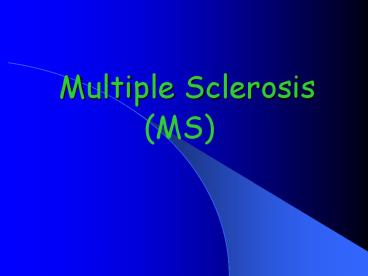Multiple Sclerosis - PowerPoint PPT Presentation
1 / 17
Title:
Multiple Sclerosis
Description:
Multiple Sclerosis (MS) MS is a disease. of the central nervous system that ... Problems tend to develop in multiple areas at different times, usually during ... – PowerPoint PPT presentation
Number of Views:3124
Avg rating:3.0/5.0
Title: Multiple Sclerosis
1
Multiple Sclerosis
- (MS)
2
MS is a disease
- of the central nervous system that interferes
with the brains ability to send and receive
messages - that is a major cause of neurologic disability
- of unknown origin
- cannot be determined by a single test
- of unpredictable time course and progression
- without a cure
3
MS Affects
- young adults usually in the mid 20s - early
30s diagnosis is often delayed - women are twice as likely to get MS than men
- Caucasians more than other races
4
Physiology
- The brain sends electrical impulses along the
nerves to various parts of the body - Interruptions of the nerve impulse is caused by a
lesion, pressure, crushing, etc. - Plaques of scar tissue replaces the myelin that
surrounds the nerve fibers in multiple areas of
the CNS - Problems tend to develop in multiple areas at
different times, usually during adulthood
5
Symptoms
- Muscle stiffness or spasms (spasticity)
- Eye problems (vision loss, blurred or double
vision,etc.) - Weakness or fatigue
- Numbing or tingling
- Dragging of feet, staggering, or loss of balance
- Shaking (tremor)
- Poor coordination
6
Symptoms (cont)
- loss of bladder or bowel control, or sexual
problems - problems with memory, concentration, or rapid
problem-solving skills - speech problems
- partial or complete paralysis of any part of the
body
7
TYPES OF MS
- RELAPSE - REMITTING
- - the symptoms flare up and then ease or even
disappear for months or years- MOST COMMON FORM
OF MS - PRIMARY - PROGRESSIVE- the symptoms are slow and
continuously worsen from the time of onset- has
no distinct relapses or remissions - Some people with relapsing-remitting MS go on
to develop the progressive form of the disease
8
TYPES OF MS (cont)
- SECONDARY PROGRESSIVE
- - experience an initial period of
relapsing-remitting and steadily worsens over
time with occasional flare-ups - PROGRESSIVE RELAPSING
- - symptoms steadily worsen from the onset, but
also have clear acute flare-ups - In contrast to relapsing-remitting MS, the
periods between relapses are characterized by
continuing disease progression
9
FACTS
- Early symptoms are often so slight that the
person doesnt seek medical help. Symptoms may
also come and go. - Other Diseases of the nervous system have some of
the same symptoms as MS. Certain psychological
problems may also have signs similar to MS
10
Areas of Plaque Formation
- Lesions can form
- - in the white matter affects sensory input
- - in the spinal cord affects sympathetic and
parasympathetic functions - - in the brainstem affects cranial nerve
functioning - - in the cerebellum affects unconscious
proprioception
11
(No Transcript)
12
(No Transcript)
13
(No Transcript)
14
Diagnosing MS
- Neurological Tests
- - test and observe UMN Signs such as
- - hyperreflexia
- - clonus
- - babinski reflex
- - test cranial nerves and observe somatosensory
and somatomotor systems for abnormalities - - EEG (Electroencephalography), studies the
brain activities for abnormalities
15
Diagnosing MS (cont)
- Lumbar Puncture
- - CSF is removed and tested for increased
amounts of protein - MRI
- - detects brain and spinal cord atrophy
- - lesions appear dark or black
16
Treatment
- Medical Approach
- - interferon beta products are disease
modifying drugs that help to decrease the
frequency and severity of MS attacks, reduce the
accumulation of lesions in the brain slow the
progression of disability - - steroids help to reduce the inflammation
- - mitoxantrone, slows rapidly worsening or
secondary progressive MS - - other special medicines to control bowel and
bladder problems, depression, spasticity, etc.
17
Therapeutic Approaches
- OCCUPATIONAL THERAPY
- Physical therapy, speech therapy and counseling
are also necessary in maintaining independence,
comfort and productivity throughout the course of
the disease































